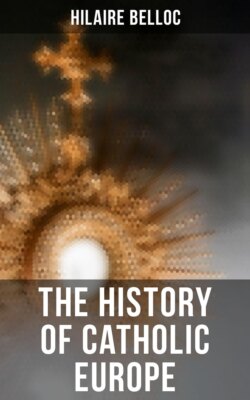The History of Catholic Europe

Реклама. ООО «ЛитРес», ИНН: 7719571260.
Оглавление
Hilaire Belloc. The History of Catholic Europe
The History of Catholic Europe
Table of Contents
EUROPE AND THE FAITH
INTRODUCTION
THE CATHOLIC CONSCIENCE OF HISTORY
I. WHAT WAS THE ROMAN EMPIRE?
II. WHAT WAS THE CHURCH IN THE ROMAN EMPIRE?
III. WHAT WAS THE "FALL" OF THE ROMAN EMPIRE?
IV. THE BEGINNING OF THE NATIONS
V. WHAT HAPPENED IN BRITAIN?
THE EVIDENCE
VI. THE DARK AGES
VII. THE MIDDLE AGES
VIII. WHAT WAS THE REFORMATION?
IX. THE DEFECTION OF BRITAIN
X. CONCLUSION
SURVIVALS AND NEW ARRIVALS: THE OLD AND NEW ENEMIES OF THE CATHOLIC CHURCH
INTRODUCTORY
CHAPTER I. THE TWO CULTURES
CHAPTER II. SURVIVALS
(i) The Biblical Attack
(ii) Materialism
(iii) The "Wealth and Power" Argument
(iv) The Historical Argument
(v) Scientific Negation
Endnotes
CHAPTER III. THE MAIN OPPOSITION
(i) Nationalism
(ii) Anti-Clericalism
(iii) The Modern Mind
Endnotes
CHAPTER IV. NEW ARRIVALS
CHAPTER V. THE OPPORTUNITY
Отрывок из книги
Hilaire Belloc
Published by
.....
St. Thomas had to fight on ground chosen by the enemy; he fought and he resisted in the spirit dictated by the Church. He fought for no dogmatic point, he fought for no point to which the Church of five hundred years earlier or five hundred years later would have attached importance. He fought for things which were purely temporal arrangements; which had indeed until quite recently been the guarantee of the Church's liberty, but which were in his time upon the turn of becoming negligible. But the spirit in which he fought was a determination that the Church should never be controlled by the civil power, and the spirit against which he fought was the spirit which either openly or secretly believes the Church to be an institution merely human, and therefore naturally subjected, as an inferior, to the processes of the monarch's (or, worse, the politician's) law.
A Catholic sees, as he reads the story, that St. Thomas was obviously and necessarily to lose, in the long run, every concrete point on which he had stood out, and yet he saved throughout Europe the ideal thing for which he was standing out. A Catholic perceives clearly why the enthusiasm of the populace rose: the guarantee of the plain man's healthy and moral existence against the threat of the wealthy, and the power of the State—the self-government of the general Church, had been defended by a champion up to the point of death. For the morals enforced by the Church are the guarantee of freedom.
.....